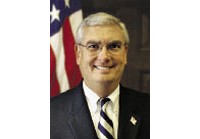Advertisement
Grab your lab coat. Let's get started
Welcome!
Welcome!
Create an account below to get 6 C&EN articles per month, receive newsletters and more - all free.
It seems this is your first time logging in online. Please enter the following information to continue.
As an ACS member you automatically get access to this site. All we need is few more details to create your reading experience.
Not you? Sign in with a different account.
Not you? Sign in with a different account.
ERROR 1
ERROR 1
ERROR 2
ERROR 2
ERROR 2
ERROR 2
ERROR 2
Password and Confirm password must match.
If you have an ACS member number, please enter it here so we can link this account to your membership. (optional)
ERROR 2
ACS values your privacy. By submitting your information, you are gaining access to C&EN and subscribing to our weekly newsletter. We use the information you provide to make your reading experience better, and we will never sell your data to third party members.
Policy
Inaction On CO2 Assailed
Congressional panel, states, and environmental activists square off against Bush Administration
by Cheryl Hogue
April 2, 2008
The Bush Administration is facing legal attacks by lawmakers, several states, and environmental groups because of its delay in determining whether carbon dioxide emissions pose a danger to the public.
A House committee plans to subpoena internal EPA documents purportedly showing that the agency had already determined at the end of 2007 that CO2 poses a danger to public health or welfare. And a number of states, joined by environmental activists, will ask a federal court to set a deadline for the agency to make public its determination about CO2.
If EPA makes official its finding that CO2 poses a danger, it must regulate vehicles' emissions of this greenhouse gas. And under the Clean Air Act, such a regulation could require the agency to impose controls on CO2 releases from other sources as well, including factories and power plants.
The requirement for EPA to make the determination about CO2 stems from an April 2007 decision by the Supreme Court. The high court agreed with a dozen states, three cities, and several environmental groups in ruling that CO2 is a pollutant that EPA can regulate under the Clean Air Act. The court instructed the agency to decide whether CO2 emissions from cars and trucks endanger public health or welfare (C&EN, April 9, 2007, page 9).
In the past year, EPA Administrator Stephen L. Johnson had told Congress that his agency was in the process of making this so-called endangerment finding. But on March 27, he announced in a letter to Congress that the agency first will ask the public for comment and then spend months analyzing this information before reaching a conclusion. Under this plan, the next administration will be left with the job of determining whether CO2 emissions endanger the public.
Yet at the end of 2007, EPA already had determined that CO2 emissions do endanger public health or welfare, EPA staff members have told Congress, according to a statement from the House Select Committee on Energy Independence & Global Warming. The committee says that in December 2007 EPA forwarded this finding, which was signed by Johnson, along with a proposal to regulate emissions from motor vehicles to the White House for review. The documents have never been made public.
But in his letter to Congress, Johnson announced he would delay EPA's decision on CO2.
"Rather than rushing to judgment on a single issue, this approach allows us to examine all the potential effects of a decision with the benefit of the public's insight," Johnson wrote, embracing an argument made by many in industry.
Rep. Edward Markey (D-Mass.), chairman of the House Select Committee, says his panel will vote on April 2 to subpoena EPA documents showing the progress the agency made in response to the Supreme Court's decision last year.
Also on April 2, which is the first anniversary of the Supreme Court's ruling, states and environmental groups are expected to file suit asking a federal court to set a deadline for EPA to announce its endangerment finding.




Join the conversation
Contact the reporter
Submit a Letter to the Editor for publication
Engage with us on Twitter